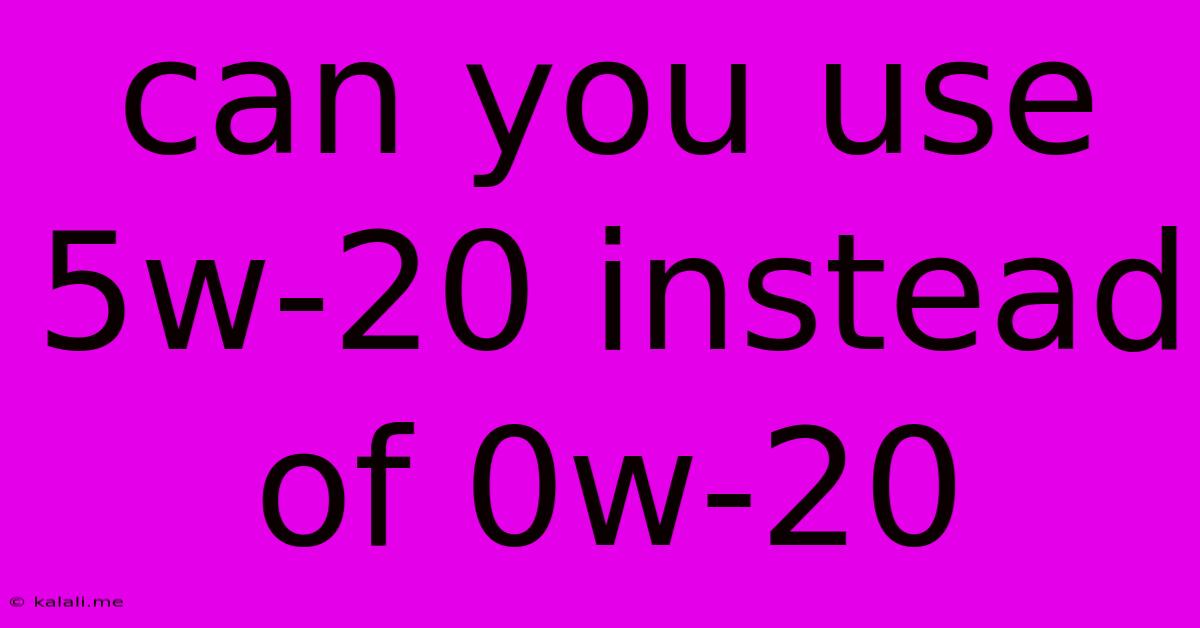Can You Use 5w-20 Instead Of 0w-20
Kalali
Jun 10, 2025 · 3 min read

Table of Contents
Can You Use 5W-20 Instead of 0W-20? A Comprehensive Guide
Meta Description: Wondering if you can substitute 5W-20 oil for 0W-20? This comprehensive guide explores the differences, potential consequences, and when a swap might be acceptable. Learn about viscosity, cold-weather performance, and engine protection to make the right decision for your vehicle.
Choosing the right motor oil is crucial for your engine's health and longevity. One common question among car owners revolves around the interchangeability of different viscosity grades, specifically whether you can use 5W-20 instead of 0W-20. The answer isn't a simple yes or no, and depends on several factors. This article delves into the details to help you make an informed decision.
Understanding Oil Viscosity and the W-Rating
The numbers in your motor oil grade (e.g., 0W-20, 5W-30) represent its viscosity, or thickness. The "W" stands for "winter," indicating the oil's performance in cold temperatures. The number before the "W" is the lower viscosity rating, signifying how easily the oil flows at low temperatures. A lower number means better cold-weather performance, allowing for quicker lubrication when starting the engine in freezing conditions.
- 0W: Indicates excellent flow at extremely low temperatures.
- 5W: Indicates good flow at low temperatures, but slightly thicker than 0W at sub-zero conditions.
- The number after the "W" (e.g., 20) represents the oil's viscosity at higher operating temperatures. A lower number here indicates a thinner oil at operating temperatures.
0W-20 vs. 5W-20: Key Differences
The primary difference between 0W-20 and 5W-20 lies in their cold-weather performance. 0W-20 is designed for superior flow in extremely cold climates, offering easier starting and faster lubrication when the engine is cold. 5W-20 provides good cold-weather performance, but might be slightly thicker at very low temperatures. Both oils share the same high-temperature viscosity (20), meaning they will have similar performance at operating temperatures.
Can You Use 5W-20 Instead of 0W-20?
Generally, using 5W-20 instead of 0W-20 is not recommended, especially in regions with extremely cold winters. While both oils offer similar protection at operating temperatures, the thicker viscosity of 5W-20 at low temperatures might lead to:
- Increased engine wear: Slightly slower oil circulation during cold starts can result in increased friction and wear on engine components.
- Reduced fuel efficiency: Thicker oil requires more energy to pump, potentially leading to slightly lower fuel economy.
- Difficult starting: In very cold weather, the thicker 5W-20 might make starting the engine more difficult.
However, there are exceptions:
- If your owner's manual permits it: Always consult your vehicle's owner's manual. Some manufacturers might explicitly state that 5W-20 is an acceptable substitute for 0W-20.
- Mild climates: In regions with mild winters, the difference in cold-weather performance might be negligible. However, it's still advisable to stick to the manufacturer's recommendation.
Choosing the Right Oil: The Bottom Line
While a temporary substitution might seem harmless, adhering to your vehicle manufacturer's recommended oil grade is the safest practice. Using the wrong oil viscosity could potentially void your warranty and negatively impact your engine's long-term health. Prioritize the oil grade specified in your owner's manual to ensure optimal engine protection and performance. Remember to always check your oil level regularly and change it according to the manufacturer's recommended schedule.
Latest Posts
Latest Posts
-
How To Use Pellets On A Smoker
Jun 11, 2025
-
Can Dogs Get Sexually Attracted To Humans
Jun 11, 2025
-
How To Get Exp Share Emerald
Jun 11, 2025
-
Gollum Tracking Fellowship Of The Ring
Jun 11, 2025
-
4 Wire Ceiling Fan Wiring Diagram With Remote
Jun 11, 2025
Related Post
Thank you for visiting our website which covers about Can You Use 5w-20 Instead Of 0w-20 . We hope the information provided has been useful to you. Feel free to contact us if you have any questions or need further assistance. See you next time and don't miss to bookmark.